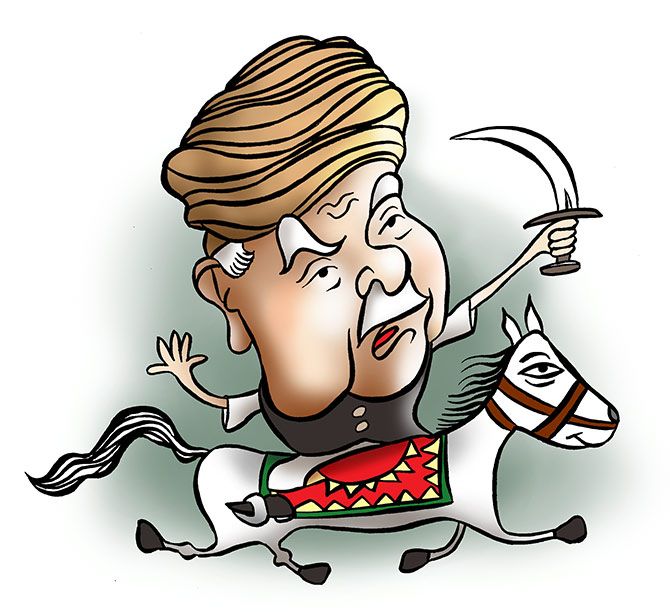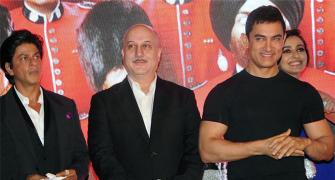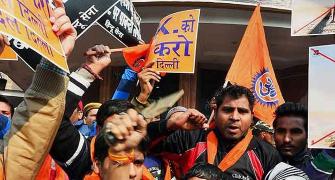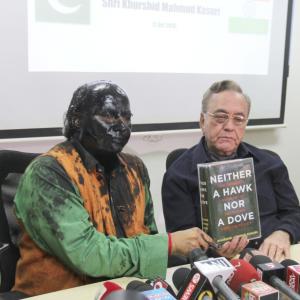'These people from Mumbai just understand the language of either silver, or shoes,' Lokendra Singh Kalvi, founder patron of the Shree Rajput Karni Sena, tells Dhruv Munjal.
Illustration: Uttam Ghosh/Rediff.com

Lokendra Singh Kalvi likes to talk ceaselessly and if there is ever a pause, it is almost imperceptible.
More palpable in his speaking is the uncompromising ardour for his cause, one that involves protecting Rajput pride.
Kalvi is the founder patron of the Shree Rajput Karni Sena, the Jaipur-based organisation whose members thrashed director Sanjay Leela Bhansali on the sets of his upcoming film, Padmavati, for allegedly showing Rani Padmini, played by Deepika Padukone, in 'poor light.'
Kalvi sounds blatantly unapologetic about the incident, which happened at Jaipur's Jaigarh Fort. Eyewitnesses say that even the film's sets were vandalised.
"No one will be allowed to distort our history. We will go to any length to save ourselves from such artistes. We have to protect our heritage," he says.
Bhansali has all along denied the film ever having an 'obscene' sequence involving Padmavati and Delhi sultanate ruler Alauddin Khilji -- the sore point between the two warring parties.
"I met Bhansali and told him that our organisation has a problem with the way the queen is been portrayed. Yet, they did not listen," says Kalvi.
"As I've said in the past, these people from Mumbai just understand the language of either silver, or shoes. We have no regret over what happened."
Kalvi, the son of the late Kalyan Singh Kalvi, a Cabinet minister in the Chandra Shekhar government in 1991, founded the Karni Sena in 2006.
The organisation is named after Karni Mata, a goddess worshipped across major parts of Rajasthan.
At the time of its inception, it set out to achieve 11 objectives, two of which crucially included opposing any political or social malice against Rajputs and opposing distortion of history.
The Karni Sena claims to have more than 700,000 registered members.
This is not the first time Kalvi has taken a filmmaker to task.
In 2008, Kalvi and his team went after Ashutosh Gowariker's Jodhaa Akbar, accusing the Aishwarya Rai starrer of inaccurately interpreting history.
Even as Gowariker refused to publicly apologise or tweak the 'objectionable' scenes, Kalvi managed to stall the film's release in a number of theatres across Rajasthan.
In 2010, Salman Khan's Veer drew the Karni Sena's ire -- apparently, a part of the film 'maligned' the Rajput community.
"Legacies are a matter of life and death. People like Bhansali can't get away with showing anything they want. In fact, all Hindus should stand up if something like this happens," says the mustachioed, silver-haired Kalvi, who at 64, now only performs an advisory role in the organisation.
All Karni Sena members who cross the age of 40 are asked to continue in the organisation only in an advisory capacity.
Interestingly, historians point out that Padmini was just a fictional character that first appeared only in 1540, in Malik Muhammad Jayasi's epochal Awadhi poem, Padmavat.
Some even compare her with Anarkali, the legendary slave girl brought to life on screen by K Asif in Mughal-e-Azam (1960).
With little or no evidence to prove her existence, many historians believe that she, too, was nothing but a work of fiction.
When reminded that Padmini is a fictional character, Kalvi says that Jayasi's poem wasn't based on historical fact.
"Jayasi interpreted her in a completely different manner. Our problem is that Bhansali is only going by the script. No where is it written that Padmini was in love with Khilji."
Kalvi's zealous interventions are not only limited to films.
He is also known for once locking horns with Vasundhara Raje, Rajasthan's chief minister, over a demolition notice sent by the Jaipur Development Authority to the Rajmahal Palace hotel, which is owned by the Jaipur royal family.
When the JDA forcefully took over the land, Karni Sena members took to the streets in large numbers, slowly building up momentum against the Raje government and eventually succeeding in forcing authorities to halt demolition work.
"We just made sure that a family doesn't get robbed of its rightful property. We showed the full strength of the Rajput community," says Kalvi.
Do read the INTERESTING FEATURES in the RELATED LINKS below.










